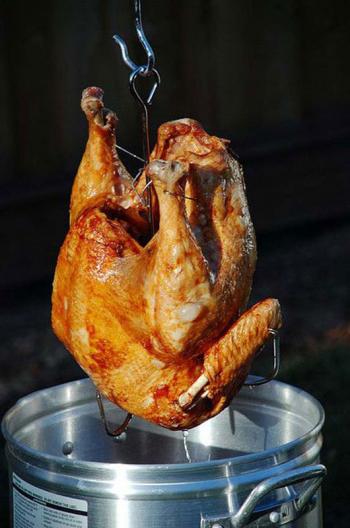
Dangers of deep frying a turkey
Don’t have room in your oven for the turkey, dressing, sweet potatoes, casseroles and pies? It is suggested that you can free-up oven space by frying the turkey outside.
Fried turkey is not as unhealthy as it sounds – if you don’t eat the skin of the bird. A study that measured the oil before and after frying has shown a 17-pound fried turkey absorbed less than a half cup of oil. And plan on at least one pound of uncooked whole turkey per person to assure a moderate amount of leftovers.
• When frying a turkey it is imperative that the bird be completely thawed, or the moisture in the bird will ‘boil’ when it touches the oil – possibly causing injury or fire. To thaw a turkey in the refrigerator safely, leave it in the original wrapping and place it on a tray in the refrigerator. Allow 5 hours thawing time per pound.
• For faster thawing, you can place the whole turkey in its original wrapping in the sink and cover it with cold water. Change the water every 30 minutes to maintain a low temperature, and allow 30 minutes per pound to thaw the turkey. After thawing, be sure to remove the giblets and neck from the interior of the turkey.
• If you choose to inject the turkey with a marinade before frying, you will need an injection kit, which is available at most grocery stores. Marinades also are available at the grocery, and the kit includes instructions on injecting the meat properly. Be sure to keep the turkey refrigerated while it is marinating.
• The amount of oil needed to fry a whole turkey will vary, depending on the size of the bird and the size of the pot used to fry it.
•Most pots require 3-5 gallons of oil. To determine the amount of oil to use, place the turkey in the cooking pot and add water to cover it by 1 to 2 inches. Then remove the turkey and measure the amount of water in the pot. This is the amount oil to use. Be sure to drain and dry the cooking pot thoroughly before adding the oil.
• Many Louisiana residents use a crawfish pot with a butane burner and a clean jambalaya stirrer to fry turkey.
• Choose oils with high smoke points such as peanut, canola, safflower or sunflower. Peanut oil is the most popular due to its abundant flavor.
Heat the oil to a temperature of 350 degrees – the point where it almost is smoking. To reduce spattering, thoroughly dry the interior and exterior of the bird. Ease the bird into the heated oil and cook it for 3-4 minutes per pound.
A food thermometer is the only way to make sure a turkey has reached a high-enough temperature to destroy harmful bacteria. Use an instant-read thermometer and check the bird after removing it from the oil. To make sure a whole turkey has reached a safe minimum internal temperature of 165 degrees, insert the thermometer in the thickest part of the inner thigh without touching the bone.
•After it’s cooked, let the turkey stand about 20 minutes before carving and eating. Leftover fried turkey should be removed from bones and stored in small, shallow containers in the refrigerator.
• The frying oil can be saved for later use. The National Turkey Federation recommends the following:
• Strain the cooled oil through a fine strainer to remove any large pieces of debris. Using cheesecloth, filter it again to remove fine particles. Pour the oil into a covered container and refrigerate it to prevent rancidity. Frying oil can be reused three to four times before it must be discarded
• While frying may produce a great-tasting bird, safety experts at Underwriter’s Laboratory warn cooks to use caution. If you use a turkey fryer, here are some of their tips for safer use:
• Turkey fryers should always be used outdoors a safe distance from buildings and any other material that can burn.
•Never use turkey fryers on wooden decks or in garages.
• Make sure the fryers are used on a flat surface to reduce accidental tipping.
• Never leave the fryer unattended. Most units do not have thermostat controls. If you don’t watch the fryer carefully, the oil will continue to heat until it catches fire.
• Never let children or pets near the fryer when it’s in use. Even after use, never allow children or pets near the turkey fryer. The oil inside the cooking pot can remain dangerously hot hours after use.
•To avoid oil spillover, do not overfill the fryer.
•Use well-insulated potholders or oven mitts when touching pot or lid handles. If possible, wear safety goggles to protect your eyes from oil splatter.
• Be sure to completely thaw the turkey to prevent splattering.
• Keep an all-purpose fire extinguisher nearby, and never use water to extinguish a grease fire. Remember to use your best judgment when attempting to fight a fire. If the fire is manageable, use an all-purpose fire extinguisher. If the fire increases, immediately call 911 for help.
•However you cook your bird, don’t forget food safety. Be sure to wash hands, utensils and cutting boards thoroughly before and after handling raw meats. Also, never leave turkey – raw or cooked – at room temperature for more than 2 hours.
• For additional information about healthful eating, contact Mandy G. Armentor, MS, RD, LDN, Area Nutrition Agent, in the Vermilion Parish LSU AgCenter Office at 1105 W. Port St. in Abbeville.
- Log in to post comments
